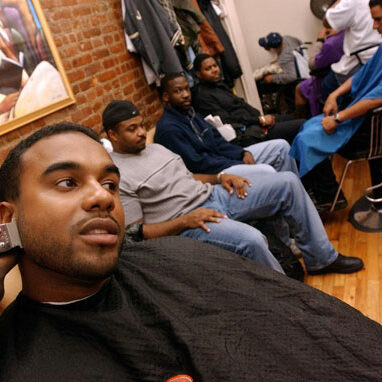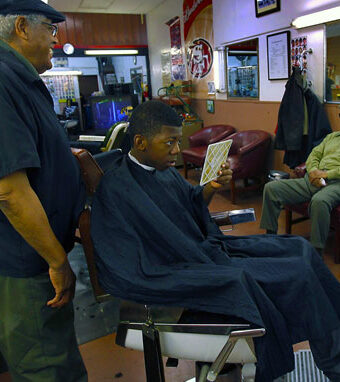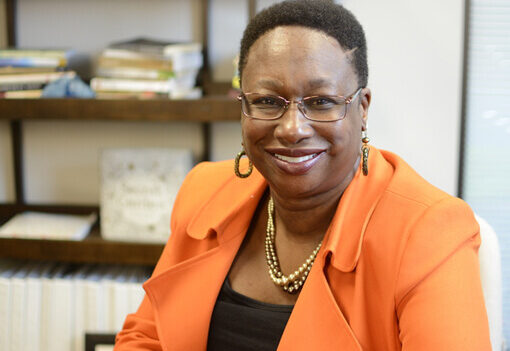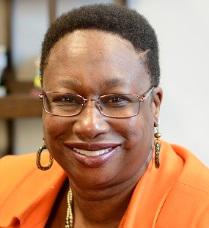
Barbershops are natural places of brotherhood and companionship, especially for black men, who can enjoy each other’s friendship and community by gathering around each other and discussing whatever topic is relevant and interesting (Ryssdal, 2014; Simpson, 2017; “Black Men and Mental Illness Can Be a Conversation, Too”, 2015). Politics, sports, romance, family, education… many subjects are discussed in this space of safe growth, but a very important one is sadly neglected: mental health.
Dr. Sonja Sutherland
CEO of The Legacy Consortium (TLC)
Director of the Legacy Changers Counseling Centers
Quick Links
Black men have been historically burdened by the need to constantly prove their masculinity by handling all issues on their own, without asking for help of any kind, avoiding any possible display of vulnerability, as showing weakness would contradict their validity as men and, in that sense, even compromise their humanity (U.S. Department of Health and Human Services Office of Minority Health, 2017). However, failing to include mental health in the rhetoric of barbershops is a huge missed opportunity. The fact that black men coming from many different walks in life meet there to talk in a fraternal manner makes it an ideal place to promote a necessary healthy conversation among a demographic that can benefit greatly from it (“Black Men and Mental Illness Can Be a Conversation, Too”, 2015).
If barbershops were directly targeted by health organizations and harnessed in their full potential, men could find themselves in a safe space where educational material to prevent or explain mental illness could be brought, as well as information on where to get the most appropriate help if they feel the urgency to talk to a professional counselor. Barbershops could function as a first point of contact for men in need of assistance with emotional problems that they do not dare talk with anyone about (“Black Men and Mental Illness Can Be a Conversation, Too”, 2015).
One of the reasons why it is urgent for black men to start a dialogue around mental health is racism. Recently, racism has been identified as a direct cause of posttraumatic stress disorder and other severe, actual physical issues, contributing to the early death of over a hundred thousand black people every year (“Black & African American Communities and Mental Health”, 2017). Arguably, some believe, that the harmful attitudes that have characterized America’s mainstream approach towards African Americans have been significantly phased out. There is enough evidence to suggest otherwise, but even if one agrees with this perspective, the remaining instances that still happen have very real and tangible consequences (Williams, 2017a).
Besides the increased propensity to negative health outcomes, there is also the historically determined, nearly ingrained distrust of authorities, who either participate in the discrimination in an active manner or fail to address it in a timely, fair manner, which leads black men to perceive said authorities as less than willing to act with their well-being in mind (“Black & African American Communities and Mental Health”, 2017).
"Serious studies report that one fifth of adult black males are more likely to report psychological difficulty than their adult white male counterparts, which interacts with poverty to make the number three times higher for those black men who are poor. Even worse, teenagers of African American descent have a higher likeliness of attempting suicide―8.3 percent vs. 6.2 percent, as per the U. S. Office of Minority Health (“U. S. Department of Health and Human Services Office of Minority Health”, 2017)."
This disparity, unfortunately, and in a very worrying manner, is also reflected by the way justice deals with offenses committed by black men: 60 percent of prisoners in America are people of color, and African Americans are statistically over-represented in jails and prisons. Non-violent crime, such as small-scale drug distribution or possession, is punished in an especially harsh manner when the perpetrator is black, a disproportion that becomes evident when we compare the estimated amount of regular drug users who are black (only 14 percent of users) and the amount of black people arrested over drug-related charges (37 percent of the entire drug-arrested population) (Kerby, 2012).
One would be inclined to think that, given the extent and significance of this type of evidence showing that black Americans continue to live beneath the consequences of discrimination, that there would be a commensurate number of counselors and physicians of African American descent available to provide the care and healing that black men need. In reality, less than 2 percent of the members of the American Psychological Association identify as either black or African American, which makes some people think that mental health professionals might not be culturally literate and sensitive enough to provide treatment for discrimination-related malaise (American Psychological Association, 2014). Also, those African Americans who dare get treatment, often find themselves becoming the unwitting target of racism and micro-aggressions from their therapists (Williams, 2017b).
These reasons interact to generate a stigma among black men regarding the use of mental health services. Black men who struggle with disorders such as depression, anxiety or other mental health issues, risk being labeled as ‘crazy’ by their African American peers, who themselves have been as just as maligned by hyper-masculinity. This reality becomes a breeding ground for even further isolation and harm (Williams, 2017a). Some men refrain from conveying their negative emotions to their family members, for fear of the same stigma around mental illness as a form of weakness.
This paints a very bleak landscape; on one hand, we have a group of individuals who are
- regularly attacked and from whom strength and invincibility are persistently demanded
- discriminated against daily and disproportionally punished by the justice system
- truly in need of intervention to prevent crumbling under the weight of racism and legal bias
This is where barbershops can truly make the difference. First, they can serve as the initial safe space where African American men get the attention they need and deserve and freely talk about their feelings and express the frustrations they are subjected to on a daily basis. Second, barber shops can serve as information centers for the community to find out about local resources that can be used to benefit those who need them, even when they cannot afford traditional mental health care (Ryssdal, 2014). Yet still another benefit, is that barbershops offer black men the opportunity to get in touch with each other in a healthy manner, to listen to invaluable advice from seniors in their communities, and to strengthen their bond without needing to reject the closeness or vulnerability that the stereotypical image of self-reliant stubbornness would have them feel is indispensable.
If you care about the future of black men in this country and if you care about how happy and wholesome a life they can live, consider supporting the “ Brother Let’s Talk” initiative, which looks to harness the safe spaces of barbershops to improve the mental health of African-American men. We need to give the men in our community the opportunity to heal. Together, we can provide for black men, a place where they can be themselves without fear of backlash. We can help them feel accepted as whole, integrated human beings, without fear of having their validity as human beings or their identity as men questioned for being unable to conform to the unrealistic demand of perfection and indestructibility.
There are many African-American men, and boys who we can help lead full lives, encompassing both their strength and their need for care, all while growing mentally and emotionally healthier in an environment of good, safe fraternity. What we do for black men now, we will reap in community-wide benefit for our families and for our future.
Brother Let’s Talk is an initiative pioneered in Birmingham, AL by Psychologist Dr. Jeffrey Moore, Community Activist Ralph Sims, Psychiatrist Dr. Artie Nelson, and Licensed Professional Counselor Jacques Austin to counteract stigma about mental health awareness in the Black community. Brother Let’s Talk is a discussion series facilitated by men of color, experts, professionals, and the community coming together to address concerns of anger, stress, grief and suicide experienced by men of color.

Join us, and help us bring this initiative to Atlanta
COUNT ME IN
Have a Barbershop in the Atlanta Area? Interested in hosting "Brothers Let's Talk" in your shop, or want to find out other ways you can get involved?
Join our mailing list to find out how you can help bring “Brother Let’s Talk” to Atlanta area barbershops!
Our Mission
Identify and reduce the stigmas men of color associate with seeking help for depression, anger, grief, trauma, and stress. Identify resources available in the community. Teach methods of coping, and how to address the stress experienced by themselves and their Brother. The goal is to “Stop the stigma, Address the stress”.
Our Method
Area psychiatrists, psychologists, licensed therapists and social workers will facilitate an open discussion bimonthly in public venues. Small discussion sessions will be held at area barbershops, businesses, religious institutions, and public locations to further the conversation about mental health. Brother Let’s Talk leaders will communicate with leaders on the local, state, and federal levels to advance awareness of the initiative to increase awareness. Growth will be achieved through individual leaders spreading knowledge and advocating in multiple cities, states and regions. Key leaders include Brother Let’s Talk advocates, barbershop/local business owners, political leaders, mental health providers, religious leaders and activists.
References
African Americans Have Limited Access to Mental and Behavioral Health Care. (n.d.). Retrieved November 25, 2017 from http://www.apa.org/advocacy/civil-rights/diversity/african-american-health.aspx
American Psychological Association. (2014). Table 1: Demographic Characteristics of APA Members by Membership Characteristics, 2014. Retrieved November 25, 2017 from
http://www.apa.org/workforce/publications/14-member/table-1.pdf
Black & African American Communities and Mental Health.(2017). Retrieved November 25, 2017 from
http://www.mentalhealthamerica.net/african-american-mental-health
Black Men and Mental Illness Can Be a Barbershop Conversation, Too. (2015). Retrieved November 25, 2017 from
https://www.huffingtonpost.com/ebonycom/black-men-and-mental-illn_b_8425998.html
Kerby, S. (2012). The Top 10 Most Startling Facts About People of Color and Criminal Justice in the United States. Retrieved November 25, 2017 from https://www.americanprogress.org/issues/race/news/2012/03/13/11351/the-top-10-most-startling-facts-about-people-of-color-and-criminal-justice-in-the-united-states/
Ryssdal, K. (2014). A history of the African American barbershop. Retrieved November 25, 2017 from
https://www.marketplace.org/2014/01/28/economy/history-african-american-barbershop
Simpson, M. (2017). Trips to the barbershop taught me how to be a man. Retrieved November 25, 2017 from
http://metro.co.uk/2017/06/29/how-trips-to-the-barbershop-taught-me-how-to-be-a-black-man-6744141/
U. S. Department of Health and Human Services Office of Minority Health. (2017). Mental Health and African Americans.Retrieved November 25, 2017 from https://minorityhealth.hhs.gov/omh/browse.aspx?lvl=4&lvlid=24
Williams, M. (2017b). How Therapists Drive Away Minority Clients. Retrieved November 25, 2017 from
Williams, M. (2017a). Why African Americans Avoid Psychotherapy. Retrieved November 25, 2017 from
Joseph Ravenell. How Barbershops Can Keep Men Healthy. February 2016 at TED2016.
https://www.ted.com/talks/joseph_ravenell_how_barbershops_can_keep_men_healthy



